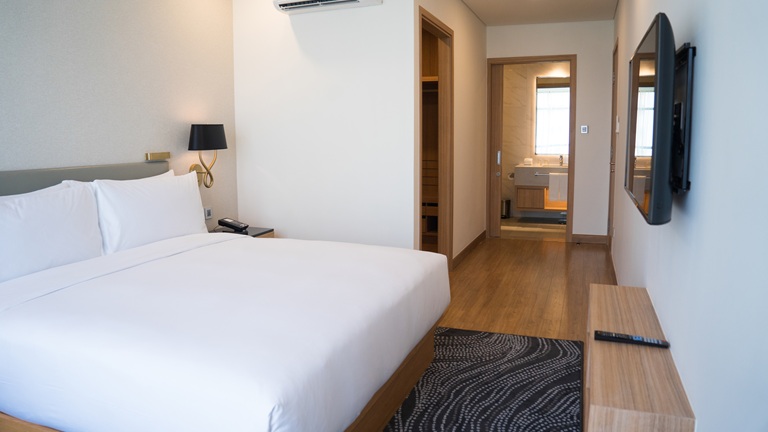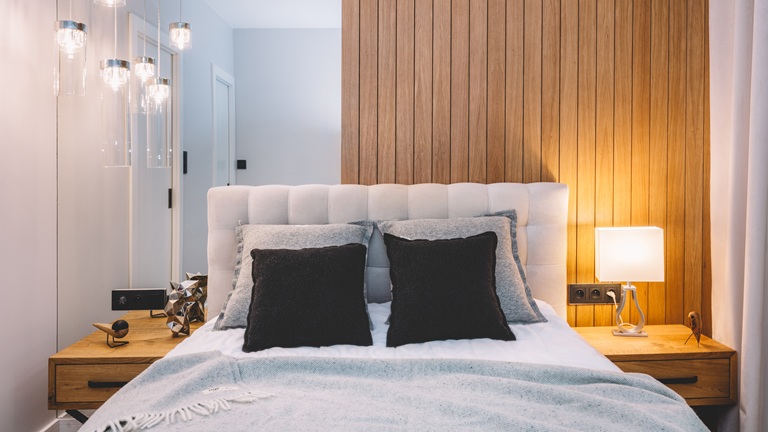Essential ways to boost your hospitality business
)
Posted: Wed 17th Sep 2025
20 min read
Running a successful hospitality business today means navigating an increasingly complex landscape.
You're operating in a world where travellers research extensively online before making decisions, reputation can shift with a single review and digital presence often determines whether guests even discover your property.
The challenges are real, but so are the opportunities. With the right strategies, you can transform your property into a sought-after destination that stands out in a crowded marketplace.
Understanding your target market
Before you can reach potential guests, you need to know exactly who they are. Too many hospitality businesses make the mistake of trying to appeal to everyone. The result is that they end up connecting with no-one.
Information about your guests
Start by diving deep into the data you already have about your guests. Who's actually staying at your property?
You might think you're attracting young professionals, but your booking data could reveal that families make up most of your revenue. This kind of insight changes everything about how you position your business.
Demographic analysis
Demographic analysis goes beyond age and income brackets. Consider the psychographic profiles of your guests.
What motivates their travel?
Are they seeking adventure, relaxation, cultural experiences or convenient business accommodation?
A boutique hotel in Edinburgh might discover its guests are primarily culture enthusiasts who value authentic local experiences over luxury amenities. Meanwhile, an airport hotel might find their guests prioritise efficiency and connectivity above all else.
Seasonal patterns
These tell their own story. Perhaps you're bustling with leisure travellers in summer but struggling to fill rooms in February.
Understanding these fluctuations helps you craft targeted strategies for different times of year. Business travellers might fill those winter gaps if you adjust your offerings accordingly.
Travellers' expectations
The pandemic caused travellers' expectations to fundamentally shift. Remote work blurred the lines between business and leisure travel.
Suddenly, guests expect reliable Wi-Fi not just in their rooms but throughout your property. They also want flexible check-in times and options for longer stays.
Generation Z travellers prioritise sustainability and social responsibility, while millennials seek Instagram-worthy moments. Baby boomers are often willing to pay premium prices for exceptional service and comfort.
How to research
Don't just rely on assumptions. Conduct regular surveys with guests, but make them worth completing. A quick post-stay email with three focused questions yields better results than lengthy questionnaires.
Monitor what competitors are doing – not to copy them, but to identify gaps in the market. If every hotel in your area targets business travellers, perhaps there's an opportunity to become the go-to spot for weekend romantic getaways.

Building a strong digital foundation
Website
Your website is often the first impression potential guests have of your property. If it loads slowly, you've already lost a significant portion of visitors.
Mobile responsiveness isn't optional anymore. Most travel research happens on mobile devices, and Google actively penalises sites that don't perform well on smartphones.
But technical performance is just the beginning. Your visual content needs to tell a compelling story. Professional photography remains crucial, but it's not just about showcasing rooms anymore. Capture the experience.
That could mean the steam rising from a morning coffee on your terrace, the warmth of your reception area or the view from your best suite at sunset. Virtual tours have evolved from novelty to necessity. They build trust by letting guests explore before booking.
Your website content should answer questions before guests need to ask them. Clear information about amenities, location and policies reduces booking friction.
Yet clarity shouldn't mean boring. Inject personality into your descriptions. Instead of "convenient city centre location", try something like "step outside and you're in the heart of Manchester's vibrant Northern Quarter".
Search engine optimisation (SEO)
SEO for hospitality needs a local focus. "Luxury hotel" is too broad. "Luxury hotel Bath city centre" or "boutique accommodation Cotswolds" connects you with guests who are actively searching for your specific location.
Create dedicated pages for local attractions, events and experiences. This positions you as a local expert while capturing valuable search traffic.
Booking system
Your booking system can make or break conversions. Every additional step in the booking process increases the chance of abandonment.
Test your system regularly. Can a guest book a room quickly and easily? Do they need to create an account first? Small friction points add up to lost revenue.
Branding
Maintaining consistent branding across all digital touchpoints builds recognition and trust. Your website, booking confirmation emails and pre-arrival communications should feel cohesive.
This extends to third-party platforms. While you can't control their design, you can make sure your property descriptions, policies and imagery remain consistent.
Mastering social media marketing
Social media for hospitality isn't about broadcasting what rooms you have available. It's about creating connections and showcasing the experiences guests can expect. Each platform serves different purposes and reaches different audiences.
Instagram remains the heavyweight for hospitality marketing.
Visual storytelling reigns supreme here, and behind-the-scenes content performs exceptionally well.
Show your housekeeping team's attention to detail, your chef preparing signature dishes or your concierge sharing local recommendations.
User-generated content is pure gold. When guests share their experiences, they're providing authentic endorsements that no amount of professional photography can match.
Create a branded hashtag and actively encourage sharing. Feature guest photos on your own feed – with permission, of course.
TikTok
TikTok might seem frivolous, but it's rapidly becoming a travel planning tool for younger demographics.
Short, engaging videos showcasing unique aspects of your property or destination can reach massive audiences.
A boutique hotel in Brighton gained thousands of followers by sharing quick tips about hidden local gems. The key to this success was authenticity over polish.
Facebook serves a different role. It's where you manage community relations and provide customer service.
Your response time to messages and comments has a direct impact on whether people decide to book. Set up automated responses for common queries, but always follow up personally.
If you cater to business travellers, don't ignore LinkedIn. Share content about your meeting facilities, corporate packages and business amenities. Engage with local business communities and corporate travel planners.
Influencer marketing
Consider carefully whether partnering with influencers is right for you.
Micro-influencers with engaged local or niche audiences often deliver better results than celebrities with millions of passive followers.
A food blogger with an engaged following might drive more bookings than a reality TV star with a million disinterested fans.
Finding the balance with your content
The balance between promotional and engaging content is delicate. Most of your content should entertain, inform or inspire. Only a small portion should directly promote bookings or special offers.
Share local events, seasonal activities and destination highlights. Position your property as part of a larger experience.

Managing your online reputation
In hospitality, online reviews wield enormous power. Small differences in your average rating can significantly affect bookings and the rates you command. Yet many properties still treat review management as an afterthought.
Getting positive reviews
Encouraging positive reviews starts with delivering exceptional experiences, but you also need to make the review process simple.
Train your staff to mention reviews during positive interactions.
"I'm so glad you enjoyed your stay! If you have a moment, we'd love to hear about your experience on TripAdvisor."
Timing matters. Send follow-up emails within a day or two of checkout while memories remain fresh.
Platform guidelines constantly evolve. What worked last year might get you penalised today. Never offer incentives for positive reviews, and don't ask staff to write reviews.
These tactics backfire spectacularly when discovered. Instead, focus on genuine encouragement and making the process effortless.
Responding to reviews
This requires some finesse. For positive reviews, go beyond generic thanks. Reference specific details they mentioned, as this shows you genuinely read and value feedback.
"We're thrilled you enjoyed the sunrise yoga session on our terrace. Sarah, our instructor, will be delighted to hear your kind words."
Negative reviews demand even more attention. Respond quickly, professionally and publicly.
Apologise for specific issues without admitting liability. Show how you're addressing concerns. Then, take detailed discussions offline.
"We're sorry your room didn't meet expectations. I've sent you a private message to discuss how we can make this right."
Monitoring feedback
Monitor mentions across all platforms, not just major review sites. Set up Google Alerts for your property name.
Social media monitoring tools catch discussions you might otherwise miss. A complaint on X (Twitter) addressed quickly can prevent a negative review elsewhere.
Learning from feedback drives improvement. Track common themes in reviews. If a number of different guests mention slow Wi-Fi or uncomfortable pillows, you've identified clear ways to make improvements.
Share positive feedback with staff to boost morale and see constructive criticism as opportunities for further training.
Creating exceptional experiences for guests
Every interaction shapes how guests perceive your business. From the moment they discover your property online to weeks after they check out, each touchpoint offers opportunities to exceed expectations or fall short.
Communicating before guests arrive
Pre-arrival communication sets the stage. Generic booking confirmations waste valuable real estate. Personalise them with local recommendations, weather forecasts or upcoming events.
If you know a guest is celebrating an anniversary, acknowledge it. Small touches create lasting impressions.
Personalisation extends throughout the stay. Note a guest's preferences from previous visits. If they always ask for extra pillows or prefer a high floor, anticipate these needs.
Technology helps, but it's the human element that matters. A handwritten welcome note trumps automated emails every time.
Training staff
How well trained your staff are has a direct impact on guests' satisfaction. Every team member is a brand ambassador.
The maintenance person who offers restaurant recommendations or the housekeeper who remembers a guest's name adds value beyond their core responsibilities.
Regular training shouldn't focus solely on procedures. Soft skills, local knowledge and problem-solving capabilities matter equally.
Creating innovative experiences
Innovative experiences create stories worth sharing. This doesn't require massive investment. A boutique hotel in York started offering guided dawn photography walks.
Cost? Minimal.
Impact? Guests rave about the unique experience and share stunning photos across social media.
Consider what unique experiences your location or property allows for. Cooking classes featuring local cuisine? Partnerships with nearby attractions for exclusive access? The possibilities are endless.
The importance of consistency
Consistency builds trust. Guests should receive the same excellent service whether:
they're checking in during peak afternoon hours or late at night
they're staying for one night or one week
it's their first visit or their fiftieth
Standard operating procedures ensure consistency, but flexibility to exceed expectations makes the difference.
After the guests have gone
Post-stay engagement often gets overlooked. A thoughtful follow-up email thanking guests for their stay and sharing a photo from their visit keeps you top-of-mind for future trips.
Birthday greetings, anniversary acknowledgements or updates about renovations and new amenities maintain connections. Just don't overdo it. Monthly newsletters quickly become spam if they lack genuine value.
Putting smart revenue strategies in place
Revenue management in hospitality has evolved far beyond simple seasonal pricing. Dynamic pricing strategies respond to real-time demand, local events and competitive positioning. But technology should enhance, not replace, human judgement.
Occupancy
Understanding the relationship between occupancy and average daily rate is crucial. Filling every room isn't success if you're leaving money on the table.
Sometimes moderate occupancy at premium rates generates more profit than full occupancy at discounted rates. Factor in the additional costs of servicing extra rooms and the equation becomes even clearer.
Creating attractive packages
Doing this without devaluing your brand requires creativity. Bundle experiences rather than just discounting rooms.
A "Taste of Somerset" package including a room, breakfast and vouchers for local attractions offers perceived value while keeping rates suitable.
Weekend packages targeting specific audiences work well. "Digital Detox Retreats" or "Writers' Weekends" attract guests who are willing to pay premium prices for curated experiences.
Bookings
Direct bookings should be your holy grail. Every booking through third-party platforms costs commission, so give people an incentive to book with you direct – without violating any agreement around rate parity.
Offer direct bookers room upgrades, late checkout or exclusive amenities.
Make your cancellation policies more flexible than what the online travel agencies (OTAs) are offering.
Highlight these benefits clearly on your website.
Your booking engine should make direct reservations effortless. If guests find it easier to book through Booking.com, you've failed.
Invest in a quality booking system that matches or exceeds the user experience of major platforms. Include real-time availability, instant confirmation and secure payment processing.
Upselling opportunities
Upselling opportunities exist throughout the guest journey. Pre-arrival emails can promote room upgrades, spa treatments or restaurant reservations.
Train reception staff to identify upgrade opportunities during check-in. A couple arriving for an anniversary might appreciate the suggestion of your honeymoon suite. Room service menus can highlight premium options or wine pairings.
Loyalty programmes for independent properties need to be structured carefully. You can't match the scale of major chains, so focus on exclusive experiences and genuine recognition.
Perhaps members receive automatic room upgrades when available, exclusive rates or invitations to special events. Make members feel part of an exclusive club rather than just collecting points.
Measuring success and future-proofing your business
What gets measured gets managed. Yet many hospitality businesses track vanity metrics while ignoring indicators that truly matter.
Occupancy percentage tells only part of the story. Revenue per available room (RevPAR) provides clearer insight into performance. Guest acquisition cost reveals whether your marketing delivers profitable returns.
Tracking marketing ROI
Tools for tracking marketing ROI have become sophisticated and accessible.
Google Analytics shows which channels drive bookings.
Call tracking reveals how online research translates to phone reservations.
Attribution modelling helps understand the full customer journey.
A guest might discover you through Instagram, research on Google, compare prices on Booking.com then book directly. Understanding this path helps you make the most of your marketing budget.
Reviewing what you're doing
Regularly reviewing your strategy stops you stagnating. Markets shift, new competitors emerge and guests' expectations evolve.
Holding quarterly reviews of your marketing performance, the competitive landscape and guest feedback keeps strategies relevant. Annual planning sessions should challenge assumptions and explore new opportunities.
Looking at current trends
Emerging trends shape tomorrow's success. Sustainability has moved from nice-to-have to essential for many travellers.
This goes beyond programmes to reuse towels. Guests want to know about your energy sources, relationships with local suppliers and impact on the community.
Wellness tourism continues growing. Properties offering yoga, meditation, healthy dining and digital detox options capture this lucrative market.
Partnerships and collaborations
Partnerships and collaborations expand reach efficiently, so think about partnering with local businesses for mutual benefit.
That could mean:
package deals with nearby attractions
cross-promotion with restaurants
exclusive rates for major employers
Destination marketing organisations offer co-operative advertising opportunities that stretch budgets further.
Using technology
Adopting technology requires balance.
Contactless check-in and digital room keys appeal to some guests but alienate others.
Artificial intelligence (AI) can personalise experiences and predict preferences, but human warmth remains irreplaceable in hospitality.
Virtual reality previews and augmented reality city guides enhance the guest experience when implemented thoughtfully.
As you consider long-term investments in better satisfying guests, remember that quality fundamentals never go out of style.
Investing in superior comfort, from your restaurant experience to your room amenities, pays dividends through positive reviews and repeat bookings.
When it comes to making sure guests get exceptional sleep, partnering with established brands like King Koil for premium bedding shows you're committed to guests' comfort.
That can become a marketable differentiator that sets your property apart from competitors.
People also read
Get business support right to your inbox
Subscribe to our newsletter to receive business tips, learn about new funding programmes, join upcoming events, take e-learning courses, and more.
Start your business journey today
Take the first step to successfully starting and growing your business.
Join for free
